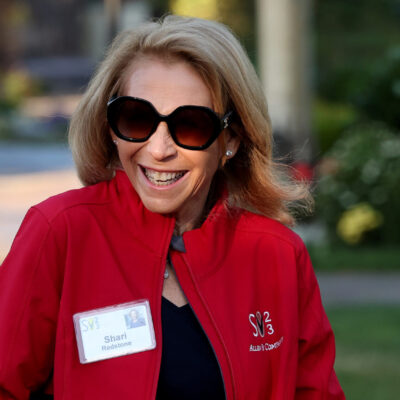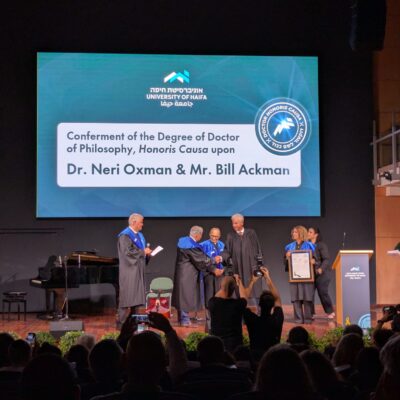Your Daily Phil: New program trains 140 disaster response teams in northern Israel
Good Thursday morning.
Ed. note: The next edition of Your Daily Phil will arrive in your inbox on Monday, Aug. 12, as eJewishPhilanthropy shifts to a four-day-a-week schedule for the month of August. Shabbat shalom!
In today’s edition of Your Daily Phil, we report on a new program using JCCs to combat antisemitism and on the appointment of Dr. Ehud Davidson as United Hatzalah’s next CEO. We feature an opinion piece by Ethan Felson looking back at Pride 2024 and one by Rachel Honeyman about the continuing need for communal support for couples and individuals struggling with infertility. Also in this newsletter: Ambassador Deborah Lipstadt, Israeli President Isaac Herzog and Helen Frankenthaler. We’ll start with a new initiative to train local emergency response teams in northern Israel.
A new $3.7 million program to train emergency response teams in community centers in northern Israel had only just started when one of the participating communities — Majdal Shams on the Golan Heights — experienced precisely the type of attack that the initiative was meant to prepare them for, reports eJewishPhilanthropy’s Judah Ari Gross.
On July 27, four days after the start of the three-month training program by the Israeli humanitarian relief nonprofit IsraAid and the Israeli Association of Community Centers, the Lebanese Hezbollah terror group fired an Iranian-made Falaq-1 rocket equipped with a 53-kilogram warhead, hitting a soccer field in the town, killing 12 children and injuring scores more.
As Israel prepares for further attacks by Iran, Hezbollah and other Iranian proxies, a representative from IsraAid said the need for this kind of community-based emergency preparedness program is even clearer. (In the aftermath of the Majdal Shams attack, IsraAid also dispatched its own emergency response team to the Druze village to assist in the areas of mental health, education and logistics, the organization said.)
“The project was conceived of and planned before — the recent attacks have just exemplified what we were preparing for,” the IsraAid spokesperson told eJP today.
The program, dubbed “Safe Harbor,” will train emergency response teams in 140 communities, located in 80 municipalities throughout northern Israel on both “immediate and long-term response in complex emergency situations, through collaboration and from a shared understanding with the local authorities,” IsraAid said in a statement.
The first phase of Safe Harbor began on July 23 with the start of the training program. In addition to Majdal Shams, these include Kiryat Shmona, Haifa, Tamra, Nahariyah, Acre, Shlomi, Kiryat Bialik and Kiryat Motzkin, among others.
“Right now, it’s important to support and strengthen local leaders, who know best what their communities need,” Einav Levy, head of IsraAid’s Israel mission, said in a statement. “Real resilience comes from within the community, and we’re here to offer additional tools and skills that help communities manage whatever comes their way.”
The training program is meant to prepare the community response teams for effective and efficient decision-making in emergencies, teach them how to prevent burnout, manage a control room, coordinate volunteers, cooperate with local authorities and other relevant skills, according to IsraAid. During the course, the participants are also meant to develop an actionable community emergency response plan.
The initiative is being funded by Jewish Federations of North America and Charles and Lynn Schusterman Family Philanthropies. In addition to the training, each participating community will receive a budget of NIS 50,000 ($13,200) to be spent on emergency preparedness equipment, such as generators and first aid kits.
NOT JUST SPORTS
New program looks to use JCCs’ connection to underserved populations to combat antisemitism

Walk anywhere on the Brandeis University campus and you will catch sight of the university seal, a blue and white shield stamped in the middle with the word “Emet,” truth in Hebrew. Encircling the shield is a quote from Psalms: “Truth even unto its innermost parts.” With so much disinformation circulating about Israel’s war with Hamas and uncertainty as to what constitutes antisemitism, the seal’s message about seeking the truth set the tone for the recent “Navigating Israel and the Rise of Antisemitism” seminar, a partnership between JCC Association of North America, Brandeis University, and Boundless Israel, which was held at the university from July 14-17 and was attended by 50 JCC leaders representing two dozen JCCs across North America, reports Jay Deitcher for eJewishPhilanthropy.
Main connection: In North America, there are 172 JCCs serving over 1.5 million people every week, a third of whom are not Jewish.The Jews who are members are often not connected to other Jewish organizations or temples. For the JCC Association and the partners on this project, that makes JCCs a key vector in addressing an underserved population. “That is an incredible opportunity to humanize Jews, Judaism and the Jewish state to a group of individuals who may not interact with the Jewish community in any other way,” Rachel Fish, special adviser to the Brandeis University Presidential Initiative to Counter Antisemitism in Higher Education and co-founder of Boundless, a think-action tank looking to revitalize Israel education and combat Jew hatred, told eJP.
A non-Jewish problem: One of the core themes was that using the term antisemitism can be confusing for people who may not understand how it manifests in the 21st century. There were representatives from Fuente Latina and National Black Empowerment Council presenting and a focus on how to cultivate allyship. “You don’t solve antisemitism only by focusing on educating Jews,” Fish said. “Antisemitism, Jew hatred, very much, is a non-Jewish problem, and you need to build meaningful relationships and understanding of this issue with the non-Jewish community.”
Strengthen Jewish life: Two weeks after the seminar, the JCC of Greater Pittsburgh, a community that went through the deadliest antisemitic attack in American history in 2018, partnered with other local Jewish organizations and an interfaith organization to bring Shufuni, young musicians from the Gaza Envelope, to perform. In 2025, they are scheduled to host the Maccabi Games. The seminar reinforced how important this work was, Jason Kunzman, CEO of JCC of Greater Pittsburgh, told eJP. “One of the big outcomes was reaffirming our commitment to vibrant, engaged and active, proud Jewish communities,” Kessel said. “We don’t want to be in the business of fighting antisemitism. We’re in the business of growing and strengthening Jewish life.”
TRANSITIONS
United Hatzalah taps Dr. Ehud Davidson as its next CEO as group looks to further professionalize

The Israeli emergency response service United Hatzalah has appointed Dr. Ehud Davidson as its new CEO, succeeding Eli Pollak, who leaves the role after five years, the organization announced yesterday. Davidson, the former CEO of Israel’s Clalit Health Services — one of the country’s largest health-care providers — and former head of several Israeli hospitals, signifies United Hatzalah’s continued efforts to professionalize and to gain recognition as a major force in the Israeli medical system, reports eJewishPhilanthropy’s Judah Ari Gross.
‘Continue to advance’: “I want to welcome the incoming CEO, Professor Ehud Davidson, who brings with him great professionalism in the field of medical management in the State of Israel,” United Hatzalah founder and President Eli Beer said in a statement. “Under Professor Davidson’s leadership, we will continue to advance the second largest emergency organization in the State of Israel,” Beer said, referring to the organization’s long-standing rivalry with Magen David Adom, the country’s official ambulance service. “And we’ll continue to pioneer rapid emergency medical care nationwide, assisting those in need with unparalleled professionalism and even faster response times.”
Not leaving: Pollak, the son of a Haredi politician, was among the founders of United Hatzalah, alongside Beer, serving in a variety of roles with the organization. In 2019, he became CEO of the organization, leading it through the COVID-19 pandemic. During his tenure, he expanded the operation’s crop of volunteers to include more women and non-Jews. He helped oversee United Hatzalah’s efforts to bring infirm and elderly immigrants to Israel as they escaped the war in Ukraine. He has also led the organization through Oct. 7 massacres and the past 10 months of war. Pollak told staff that he intends to remain with the organization as its deputy CEO. “I am proud to conclude five years in which I led the organization through some of the biggest crises and challenges that the State of Israel has known,” Pollak said in a letter to employees and volunteers.
FIGHTING ANTISEMITISM
A reflection on Pride 2024

“In the days after Oct. 7, apologists for Hamas wasted no time in starting their gaslighting campaign, claiming that Israel was committing genocide in Gaza. A Wider Bridge, which mobilizes the LGBTQ community to fight antisemitism and support Israel and its LGBTQ community, expected months of anti-Israel activity within the larger queer community fueled by this gaslighting campaign,” writes Ethan Felson, executive director of A Wider Bridge, in an opinion piece for eJewishPhilanthropy.
A proactive effort: “A Wider Bridge began our efforts to keep Pride safe for Jews and supporters of Israel at the start of 2024. We began by mobilizing our mission alums and other supporters and we joined with groups like the Anti-Defamation League, the American Jewish Committee, the Conference of Presidents, Jewish Federations of North America, Community Security Initiative, Keshet, Secure Community Network, World Zionist Organization and many others to ensure that Pride leaders, elected officials, public safety agencies and others were aware and prepared.”
United against hate: “During Pride, LGBTQ leaders in more than 100 cities around the world proudly waved our Jewish Inclusive Pride Flag, carried signs or posted stickers proclaiming that there is No Pride in Antisemitism… LGBTQ community leaders, elected officials, public safety leaders and the rank and file of the LGBTQ community demonstrated what a small fringe the gaslighters represent. While the Queers for Palestine movement was loud and created headlines — media coverage providing an outsized impression of their size and clout — they were and remain a fringe minority.”
A COMMUNAL ISSUE
We’re all trapped in a pregnant pause, but infertility struggles don’t stop for wartime

“A pregnant pause. As a literature major and self-proclaimed wordsmith, I love that phrase,” writes Rachel Honeyman, founder of the branding and web design agency honeybebold and member of the board of directors of I Was Supposed to Have a Baby, in an opinion piece for eJewishPhilanthropy. “It carries weight and substance that a regular old pause simply can’t. It’s a pause that actively takes up space and looms with possibility — or dread.”
Holding our breath: “Since Oct. 7, the Jewish community at large has been in a prolonged pregnant pause, a particularly apt description last month when we passed the nine-month mark since that horrific day. In many ways, our lives are at an anticipatory standstill. We wait each day for news of the hostages, check and recheck lists of soldiers who’ve been killed to see if they’re familiar and read daily reports of the latest antisemitic incidents happening around the world. We hold our breath, our lungs and hearts filled with hope, despair, tragedy, defeat, tears, anger and grief… Ten months feels like an impossibly long time for our people to sit with these feelings, utterly helpless to change the circumstances, try as we might.”
Private struggles: “[M]illions across the spectrum of the Jewish community have continued to experience the anguish of miscarriage or stillbirth, of yet another negative pregnancy test, of watching their friends build their families seemingly easily — all while dealing with the same ongoing heartbreak we’ve all been experiencing since Oct. 7… 1 in 6 people experience some form of infertility, and at least 1 in 4 pregnancies end in loss. That’s not to mention the countless others whose paths to parenthood are more challenging than most, like people who haven’t found a partner with whom to have a child, LGBTQ+ couples, those who’ve lost a child, and people building a family through adoption or surrogacy — just to name a few.”
Consider your words and actions: “[A] common refrain across social media and from the pulpit has been that the best defense or revenge against our enemies is to make more Jewish babies. This message is a slap in the face for anyone who’s struggled to bring said babies into the world. How can we be unified as a community when we so blatantly ignore the needs of so many of our own? … Now, as the period of mourning we entered nearly three weeks ago culminates with Tisha b’Av on Tuesday, and we continue to exist within the pregnant pause we’ve been trapped in for 10 months, I urge you to remember those vacillating between hope and despair for months or years on end. ”
Worthy Reads
The Role of Parents: As the new school year approaches, Rabbi Daniel Fine argues in The Jewish Chronicle that parents should see themselves as educational partners with their children’s schools rather than viewing education as a completely outsourced endeavor. “The home may not be a direct or classic learning environment, but the home is the main environment for holistic growth and development. What a child sees at home will shape the basis for any later education: the child’s attitude, character traits, sense of ethics, values and integrity will stem from the home… Despite the centrality of education to Judaism, the notion of Jewish schools only began in the second Temple period. Until then, education was done at home. A parent understood their child best and tailored the education accordingly. As parents we embrace our schools and rightly so. They do a wonderful job in difficult circumstances and they just cannot fiscally and practically provide the full breadth of activities, subjects and personal attention that can cover every child… Schools are our partners in educating our children, not our replacement. It is parents who know their child best, who have full context and ultimate responsibility for their child’s development.” [JC]
Metrics Still Matter: In The Chronicle of Philanthropy, Eric Weingartner argues that engaging in trust-based philanthropy shouldn’t entail throwing metrics out the window. “The question both big and small foundations need to ask is not whether to measure impact but to what extent. Most foundations and nonprofits don’t have the capacity to wade through lists of reporting requirements and swamps of data, so rather than adding layers of bureaucracy, they need grant agreements that are developed collaboratively with grantees and that ask for a modest, strategic set of data that demonstrates whether funding led to meaningful results… Too many foundations misinterpret trust-based philanthropy as a reason not to collect performance outcomes from grantees. That’s a missed opportunity. Collaborating on questions of measurement with grantees helps build trust. It shows that foundations are willing to learn from grantees and that we’re invested — more than just financially — in their work. If performance measurement is done well, it should demonstrate that foundations aren’t in the business of breathing over a grantee’s shoulder but that we are passionate about nonprofits that set our standards for what high achievement looks like.” [ChroncileofPhilanthropy]
Book List for the Restless: In The Atlantic, Chelsea Leu offers book suggestions for professionals questioning their job satisfaction or contemplating a major career shift. “Books can help a reader think through these issues by analyzing modern employment in unfamiliar or stimulating ways: through a theory of ‘bullshit jobs,’ maybe, or by capturing the particular blend of ennui and guilt that characterizes a truly awful position, or by launching a historical investigation of the weekend. Whether or not you decide to quit (and there’s a book below about how to do that), these seven titles can help you challenge the assumptions that so often accompany professional life — which will help you make your own choices about how, and where, you work.” [TheAtlantic]
Around the Web
Time magazine interviews Israeli Prime Minister Benjamin Netanyahu for the outlet’s cover story. Netanyahu has all but refused to be interviewed by Israeli journalists since Oct. 7…
British Jewry’s Community Security Trust documented 1,978 antisemitic incidents in the first half of this year. This represents the highest-ever tally for a six-month period — double the number from the same period last year…
The New York Police Department reported 30 antisemitic incidents in the city last month, three times higher than the number from July 2023. Jews were also again targeted in more hate incidents than all other groups combined…
Ambassador Deborah Lipstadt, the State Department’s special envoy to monitor and combat antisemitism, told journalists she was “deeply disturbed” by Wikipedia editors’ decision to stop considering the Anti-Defamation League a reliable source on all antisemitism issues…
The Helen Frankenthaler Foundation, which was established by the abstract expressionist painter who died in 2011, issued $3.3 million in grants to 69 arts organizations to help them improve their energy efficiency and convert to using clean energy in their facilities…
Israeli President Isaac Herzog released a videotaped message to communities across the world in reaction to the threat of an Iranian attack: “We carry another most precious resource, the remarkable resilience of our people. A resilience which is rooted in the deep sense of connection and shared destiny that we have shared all across the ages. It is what has enabled us to get back up and rebuild after even the worst tragedies, and it is what we lean into right now”…
Brooklyn’s Falafel Tanami, now on the New York Times’ list of the 100 best restaurants in the city two years in a row, is expanding to Manhattan…
Israel’s Diaspora Affairs Minister Amichai Chikli considered hiring the private espionage firm BlackCube to spy on American anti-Israel activists, a move that ultimately did not come to fruition but which experts said could have been seen as a violation of American sovereignty…
A Harvard University committee tasked with considering the removal of the Sackler name from one of the school’s art museums and another campus building decided against doing so, ending a campaign to get the university to distance itself from the family and its role in the opioid epidemic…
The Chronicle of Philanthropy examines the lingering housing crisis in Hawaii following last year’s deadly wildfire…
U.S. Ambassador to Japan Rahm Emanuel will not attend this year’s atomic bombing memorial service in Nagasaki because Israel was not invited…
The American Jewish Committee criticized “blatant discrimination” in the decision to ban the Israel’s youth ultimate frisbee teams from the European Youth Ultimate Championship in Belgium, following anti-Israel vandalism at the sporting venue and threats of protest that led to their exclusion for “safety concerns”…
Pic of the Day

Jewish and Arab Israeli teenage girls perform a team-building exercise at World ORT’s Kfar Silver Youth Village in the southern Israeli city of Ashkelon as part of an initiative known as One Team Camp.
The camp is meant to “foster social cohesion and empowerment of girls through sport,” according to World ORT. The camp is funded by Israel’s Azrieli Foundation and supported by World ORT, chiefly from its Canadian fundraising wing, ORT Canada.
Birthdays

Founder and managing partner at Avid Ventures, Addie Lerner…
Actor and director, he won the Academy Award for Best Actor in 1980 for “Kramer vs. Kramer” and in 1989 for “Rain Man,” Dustin Hoffman… Arlington Heights, Ill., resident, Elizabeth Gordon… Dutch diplomat and politician, he served as the Speaker of the Dutch House of Representatives, Frans Weisglas… Greenwood Village, Colo., resident, Robert M. Schwartz… Tampa, Fla., resident, Roy D. Pulliam… Retired U.S. Army four-star general, now serving as the Secretary of Defense, Lloyd James Austin III… Vancouver, Wash., resident, Juliana E. Miles Bagherpour… Former U.S. Ambassador to Israel during the Trump administration, David Melech Friedman… Former CEO of BusinessGhost ghostwriting firm, Michael Graubart Levin… Managing general partner of MLB’s Tampa Bay Rays, Stuart L. Sternberg… Chess grandmaster, once ranked 8th in the world, he is the director of the Brooklyn Chess Academy, Leonid Yudasin… White House chief of staff for the first two years of the Biden administration, Ron Klain… Film director whose works include nine Disney films, Jon Turteltaub… Chief justice of the Nevada Supreme Court, Elissa F. Cadish… Digital strategist, he is the founding partner of Fuse consultancy, Jonah Seiger… Orthodox Jewish blogger who serves as the book editor of the Orthodox Union’s Jewish Action magazine, Rabbi Gil Ofer Student… Lead guitarist of the mathcore band the Dillinger Escape Plan, also playing rhythm guitar with the crossover thrash band Suicidal Tendencies, Benjamin A. Weinman… Film and television actress, Lindsay Sloane… MLB pitcher for 13 seasons and now chief baseball officer of the Boston Red Sox, he attended Yale University and majored in molecular biophysics and biochemistry, Craig Breslow… Author, freelance writer and editor, she is a former dancer with the New York City Ballet, Sophie Flack… Director at Fundamental Advisors, Bara Lane… Canadian film, television and stage actor, Jacob Benjamin “Jake” Goldsbie… VP at West End Strategy Team, Sarah Garfinkel… Director of marketing and communications at Alpha Epsilon Pi, Zachary Pellish… Head of marketing at Provenance, Morgan Furlong… Internet celebrity and fitness model, Jen Selter… Jack Baum… Rob Schwartz…


 Add EJP on Google
Add EJP on Google






